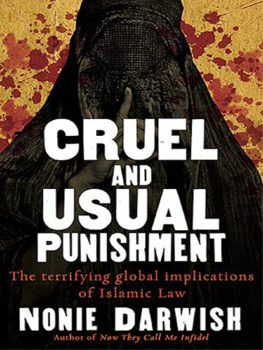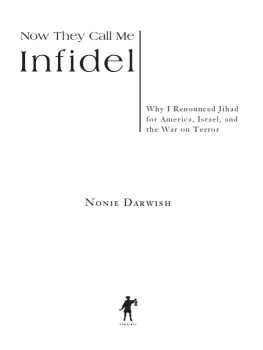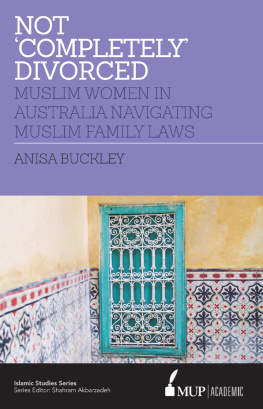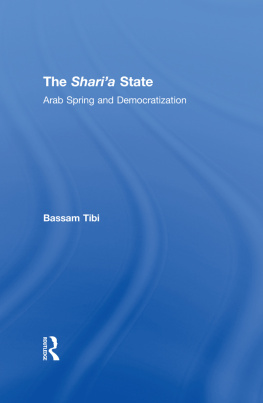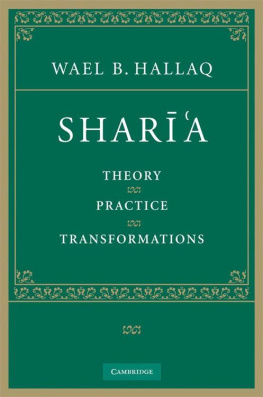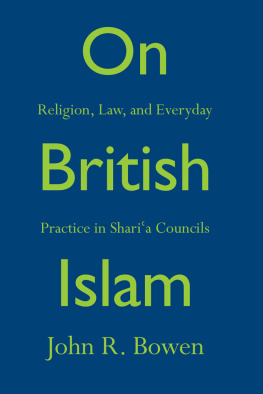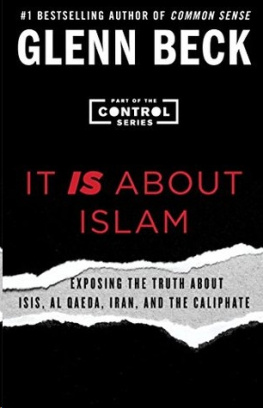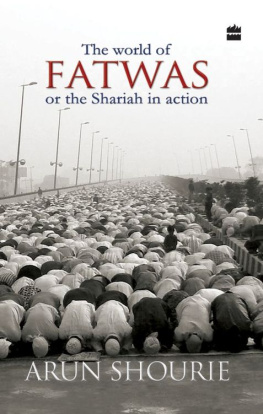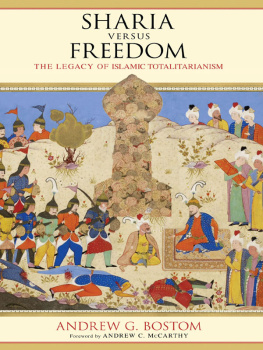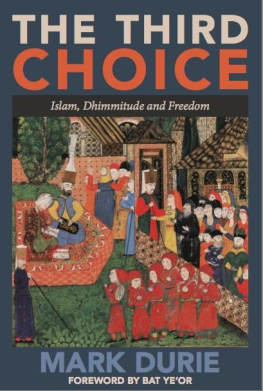CRUEL
AND
USUAL
PUNISHMENT
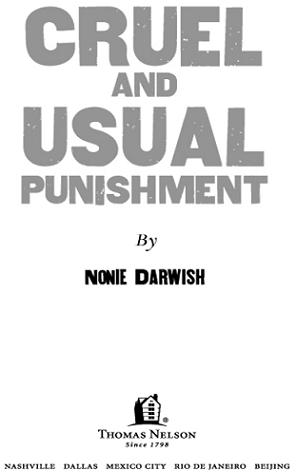
2008 by Nonie Darwish
All rights reserved. No portion of this book may be reproduced, stored in a retrieval system, or transmitted in any form or by any meanselectronic, mechanical, photocopy, recording, scanning, or otherexcept for brief quotations in critical reviews or articles, without the prior written permission of the publisher.
Published in Nashville, Tennessee, by Thomas Nelson. Thomas Nelson is a registered trademark of Thomas Nelson, Inc.
Unless otherwise noted, Scripture quotations are taken from the HOLY BIBLE: NEW INTERNATIONAL VERSION. 1973, 1978, 1984 by International Bible Society. Used by permission of Zondervan Publishing House. All rights reserved.
Editoral staff: Thom Chittom and Heather Skelton
Thomas Nelson, Inc., titles may be purchased in bulk for educational, business, fundraising, or sales promotional use. For information, please e-mail SpecialMarkets@ ThomasNelson.com.
ISBN 978-1-59555-209-9 (IE)
Library of Congress Cataloging-in-Publication Data
Darwish, Nonie.
Cruel and usual punishment / by Nonie Darwish.
p. cm.
Includes bibliographical references and index.
ISBN 978-1-59555-161-0
1. Islamic lawSocial aspects. 2. WomenLegal status, laws, etc. (Islamic law) 3. IslamControversial literature. I. Title.
KBP173.25.D37 2008
340.5'9dc22
2008046080
Printed in the United States of America
08 09 10 11 12 QW 6 5 4 3 2 1
To my family
I take no pleasure in the death of the wicked, but rather that they turn from their ways and live.
EZEKIEL 33:11
Contents
FOR THE FIRST THIRTY YEARS OF MY LIFE, I LIVED as a virtual slave. I was a bird in a cage; a second-class citizen who had to watch what I said even to my close friends. Under Islamic law I had to live in a gender-segregated environment and always be aware that the legal and social penalty for sin could end my life. This is what it is to live as a woman under Sharia law. Sharia (the body of Islamic law) is different from law in the West, because it deals with all aspects of day-to-day life, including politics, economics, banking, business law, contract law, marriage, divorce, child rearing and custody, sexuality, sin, crime, and social issues. Among other things, it allows a woman seen without a headdress to be flogged, punishes rape victims, and calls for beheading for adultery. I never questioned or challenged itor dared to even think about its validity.
During my years in Egypt, the vast majority of Muslim women lived in cramped apartments or unhealthy little mud huts, spending their entire lives working hard under the severe Egyptian sun. Yet they rarely complained or made an effort to change their circumstances.
Whatever came their way, no matter how hard or unjust, they viewed it as Gods will. They struggled, coped, adapted, and bent their lives, denying their most basic human needs to suit Sharias cruel misogyny. Most women got used to their cages, but even the most opulent palace can still have bars.
None of us tried to examine what Sharia was, ask how it came about, or question why we followed it. This is Allahs law, we were told. Doubting any word from the Quran (Islams holy book) or Mohammed (the founder of Islam) is haram, a sin, and we all knew what awaited those who questioned Allahs law: death.
Now that this life is behind me, I feel it is very important to share my experiences with citizens of Western nations and to explain how these brutal Islamic Sharia laws not only control every aspect of the lives of followers of Islam in the Middle East, but also how Sharia law is on the march to Western nations.

To escape Sharia marriage laws, I moved to America in 1978, in large part to be able to marry an Egyptian Coptic Christian. Even so, it was necessary for him to convert to Islam in order to protect me from the long arm of Sharia law. My move to America in 1978 liberated me from life under the most oppressive system of laws in the worldthe best gift that living in America has given me. To live under Islamic Sharia law is to live in the worlds largest maximum-security prison, and I for one dont want to be incarcerated again.
For the next twenty years, I quietly lived the American dream. I raised a family, had a good job, and generally enjoyed the freedoms of a democracy that respects the rights of individuals. One day, trying to impress a close family friend visiting from Egypt, we visited a mosque for Friday prayers. As I listened to the sermon, I was amazed at the radical tone. Even my Egyptian friend was offended and asked to leave. Something was happening in the America I loved, but I pushed it out of my mind and did nothing. Later, in the summer of 2001, I took my American born children for a visit to Egypt and was struck by how much more radical Egypt had become. I returned to the U.S. on September 10, 2001, and woke to a nightmare the next morning. When I saw the second plane fly into the Twin Towers, I knew that jihad had come to America, and my life would change forever. I would need to speak out to warn my fellow Americans of what was coming.
For me, what is most troublesome is not the terrorists attacking from the outside, terrible as that is. It is the attack on democracy from within. The radicals and Sharia enforcers are now here in the West and often operate under the radar of Western law and their open systems of government. Demands for Sharia have arrived on the shores of Europe and America by Muslim minorities who demand it as part of their religious rights. Informing the West of the tragedy of Sharia Law and its impact on women, the Muslim family, and society has thus become my objective. I began writing about it and was invited to speak on college campuses across the country. After the publication of my book Now They Call Me Infidel, I began traveling around the country speaking out.
Muslim Sharia Goals in the West
In the fall of 2007, I was part of a panel discussion called Islam and Democracy: Companions or Competitors? at Mount San Antonio College in Southern California. What happened afterward is indicative of the kind of viewpoints I am hearing from young Muslim students across the country. It is something that we need to be aware of and understand. To ignore this would be at the peril of our democracy.
One of the panelists, the head of the Muslim student organization, fiercely defended Sharia. After the discussion I asked him, If Sharia is the perfect system that every Muslim should follow, why are you living in America and not in a Muslim Sharia state such as Iran or Saudi Arabia? His answer was that not one Muslim country applied Sharia as it should and that is why he was in America.
In the heated discussion that followed, another student who believed that Muslim countries failed to bring about the true Sharia state, actually believed that perhaps the United States could be the first country to apply Sharia the proper way, the way it was intended by Allah. Many of the students echoed that belief, and some even expressed a desire to demand the enforcement of Sharia in America.
Here is an important distinction: it is not just that they intend to perfect and correct Sharia in their own countries of origin and then gradually expand this perfected Sharia-driven society outward to the rest of the world. Rather, they want to supplant or transplant a way of life to America and the Westeven though they know it has never worked and has left behind a trail of destruction, misery, stagnation, and cultural chaos in Muslim countries. Their intent is nothing less than the wholesale supplanting of Western civilization and constitutional law with their ideal of the perfect Sharia-based society, one that has never existed except in their fantasy of Andalusia Spain under Arab rule.
Next page
